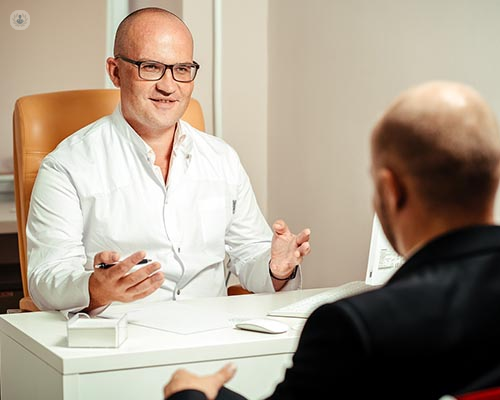Exploring bladder cancer: an informative guide for patients
Autore:Being diagnosed with bladder cancer can be a daunting experience, but understanding the condition and its treatment options can empower you to make informed decisions about your health. Leading consultant urologist Mr Mark Lynch explores what bladder cancer is, its causes, symptoms, diagnosis, and treatment options.

What is bladder cancer?
Bladder cancer occurs when abnormal cells grow uncontrollably in the bladder, the organ responsible for storing urine. These abnormal cells form a tumour, which can be benign (non-cancerous) or malignant (cancerous). In the case of malignant tumours, they have the potential to spread to other parts of the body if left untreated.
Understanding the causes
The exact cause of bladder cancer is not always clear, but several factors can increase your risk of developing the condition. Smoking is the most significant risk factor, with smokers being up to three times more likely to develop bladder cancer than non-smokers. Exposure to certain chemicals in the workplace, such as those used in the dye industry, can also increase your risk. Other factors, such as age, gender, and family history, may also play a role.
Recognising the symptoms
It is crucial to be aware of the common symptoms of bladder cancer, which include:
- Blood in the urine (haematuria), which may be visible or detected under a microscope.
- Frequent urination.
- Pain or burning sensation during urination.
- Pelvic or back pain.
- Unexplained weight loss.
If you experience any of these symptoms, it's crucial to consult your doctor promptly for further evaluation.
Diagnosis
If your doctor suspects bladder cancer based on your symptoms and medical history, they will perform several tests to confirm the diagnosis. These may include:
- Urinalysis: A simple urine test to check for the presence of blood or abnormal cells.
- Cystoscopy: A procedure in which a thin, flexible tube with a camera (cystoscope) is inserted into the bladder to examine its interior.
- Imaging tests: Such as ultrasound, CT scan, or MRI, to get detailed images of the bladder and surrounding structures.
- Biopsy: A tissue sample may be taken during cystoscopy to confirm the presence of cancer cells.
Treatment options
The treatment for bladder cancer depends on various factors, including the stage and grade of the cancer, your overall health, and personal preferences. Common treatment options include:
- Surgery: Removal of the tumour or, in more advanced cases, partial or complete removal of the bladder (cystectomy).
- Chemotherapy: Medications that kill cancer cells or stop them from growing.
- Immunotherapy: Drugs that help your immune system identify and destroy cancer cells.
- Radiation therapy: High-energy rays targeted at the cancerous cells to kill them.
Your medical team will discuss the most suitable treatment plan for you, taking into account all relevant factors.
Navigating a diagnosis of bladder cancer can be challenging, but with the right information and support, you can take control of your health and make informed decisions. Remember to consult your urologist for personalised advice and guidance tailored to your specific needs.
If you are concerned about bladder cancer and would like to book a consultation with Mr Lynch, do not hesitate to do so by visiting his Top Doctors profile today.


